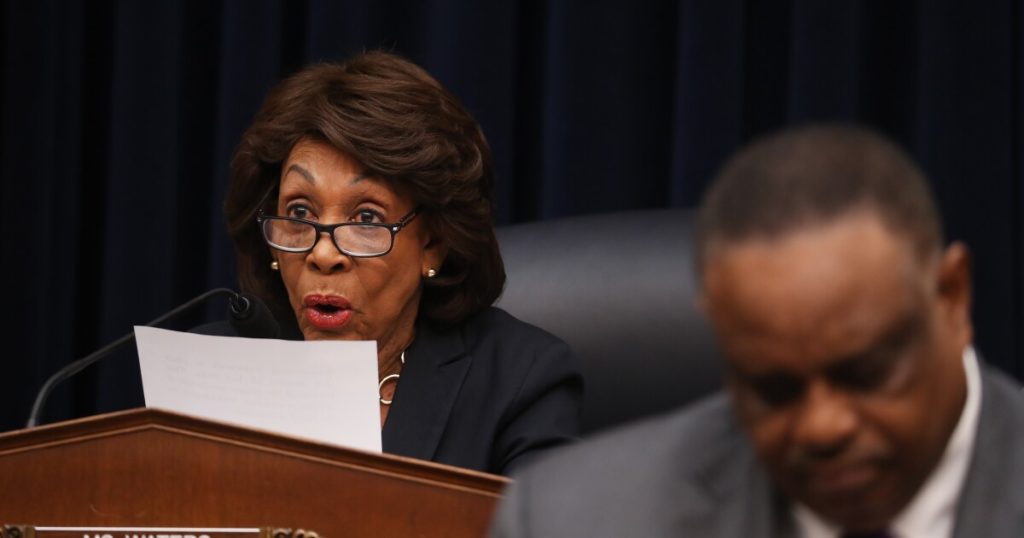Andrew Harrer/Bloomberg
WASHINGTON — Rep. Maxine Waters, D-Calif., has introduced a bill that would direct agencies to raise the deposit-insurance limit for business accounts, part of a growing bipartisan movement to do so that could see substantial progress in the next Congress.
The bill comes after the
“As we saw with the collapse of Silicon Valley Bank, when banks quickly fail, small businesses are left scrambling to figure out how they’re going to pay their hardworking employees if they lose any money, while other businesses quickly transfer their funds from community banks to megabanks,” Waters said in a statement.
“Or worse, they lose funds through no fault of their own because their community bank fails and is too small to protect with emergency tools, as was the case with First National Bank of Lindsay,” Waters said. “This is not fair to small businesses or their workers, and this threatens to undermine community banks and credit unions while even more power is concentrated in our megabanks.”
Waters, the top Democrat on the House Financial Services Committee, introduced the bill to authorize the Federal Deposit Insurance Corp. and the National Credit Union Administration to increase the deposit and share insurance threshold for businesses accounts from where they currently stand at $250,000.
The bill doesn’t contemplate where the new limit should be, instead directing the FDIC and NCUA to study and determine the higher threshold, as well as what kind of transaction accounts would be covered.
The idea behind the bill has bipartisan support, even at high levels in the incoming Trump administration. Vice President-elect JD Vance, currently the Republican senator from Ohio, introduced a bill in the immediate wake of the Silicon Valley Bank crisis to
“The idea is that if you have a few million dollars that comes in at the end of the day and accounts receivable in your bank collapses, you’re not penalized for this,” Vance said at a hearing last summer where he introduced his bill. “In other words, we’re not penalizing businesses for using a bank as a bank.”
Waters’ comments also echo those of Consumer Financial Protection Bureau Director Rohit Chopra at a
“Big businesses putting their money in big banks enjoy free deposit insurance, and small businesses putting their money in small banks don’t,” Chopra said in a statement for the record. “This is fundamentally unfair.”
The intent behind the legislation might also find purchase in the House Financial Services Committee’s incoming Chairman Rep. French Hill, R-Ark. Hill
“I think the events surrounding Signature and Silicon Valley will prompt a post-Congressional and financial federal regulatory review of the deposit-insurance system,” he said. “I recall very well that from 2009 to 2010 when the federal government guaranteed all deposits in that period of time, many people suggested that all deposits would go to the large [globally systemically important]-type banks.”
A few other lawmakers introduced similar bills, although the Waters version is more detailed. Sen. Joe Manchin, D-W.Va., alongside Sens. Michael Braun, R-Ind., and John Hickenlooper, D-Colo., introduced
Waters’ bill allows the FDIC and the NCUA to establish a Transaction Account Guarantee program, a blanket guarantee for noninterest bearing deposits, for six months. That could be extended to up to nine months with the approval of the Secretary of the Treasury, and beyond that with congressional approval.
The TAG program, originally created by the FDIC in 2008 to respond to liquidity concerns during the crisis, was
Waters’ bill would also give Congress a level of oversight into the process — an element that will be key to garnering Republican support in a GOP trifecta next year. It would require the FDIC and NCUA chairs to testify as to their findings on a proposed rule to raise deposit insurance for certain accounts, and to testify again after 30 months if they haven’t proposed a final rule. The Government Accountability Office would also be required to study the issue and give recommendations.
“The simple truth is small businesses need reliable banking services, and they should be able to work with local financial institutions in their community,” Waters said in the statement. “My bill … will expand deposit-insurance coverage for business accounts, so entrepreneurs are protected if their depository institution fails.”
